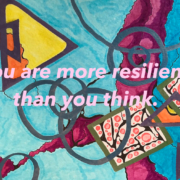I was parked on the street in front of a cute little bungalow about to meet my real estate agent one fine summer afternoon. We were scouting out homes for a pending move my husband and I had decided to make in an effort to downsize. I was just swinging open the driver’s side car door when I saw a blue blur of a car race past me, ripping it right off the hinges as it went. Had I been swinging my legs to get out, they would have been gone too, along with the car door. Fortunately, that did not happen.
Posts
Ahhhh. We do love a quiz that promises to reveal ourselves to our, well, ourselves. And big business loves to to see how well you might fit into their organizational team. That we love personality tests is the why that drives their proliferation. But I wonder if you might like to understand why many of them are junk, clickbait, and rather useless. And how to pick one that gives useful information about your personality. I am going to help you do that!
The worry box technique is a simple skill used to help you manage when and how you worry. This sounds simplistic, and on its face it is. However, the results can truly help you place and pace worry better than simply allowing the random worries to crawl around in your head in the unending, unresolved circular pattern they tend to create.
Why Bother Using Coping Skills?
If you aren’t practicing coping skills you learn in therapy regularly while calm, there’s a good chance a skill such as deep belly breathing won’t be as effective as you’d like. When the nervous system dysregulates quickly to fight or flight, instantly really, that lets me know you may need to work on stretching the threshold for your fight or flight response, which requires practicing coping skills when calm.
Have you ever thought about this? Do you over-explain something when you are saying no to a request, or to an intrusive question? Did you know that you do not have to explain your thoughts to someone simply because they asked? And that the tendency to do this typically occurs with someone we care about, or someone that has power over us? Learning this is crucial to your ability to set a clear and healthy boundary.
Have you ever wondered why your partner triggers such an immediate response in you? Would you like to get curious not furious? Understanding your attachment style, or the way you related growing up to your primary caregiver, can provide a clue to the immediate, visceral reactions you have at times in your current relationships. Instead of getting furious, you can get curious!
If you have anxiety sensitivity, here are 10 factors that contribute to “Sticky Thoughts.” Sticky thoughts are the ones you just can’t shake loose. Sticky thoughts predispose your mind to anxiety and hyper-vigilance. They tend to keep you stuck in your own personal anxiety loop that is both unproductive and self-shaming. That is why learning to identify and talk back to them is critical to your good mental well being.

Feeling stuck?
The 10 Sticky Thoughts Factors
- Sleep deprivation/insomnia
- Drinking alcohol
- [Some] OTC medications
- Steroids of any type, asthma meds
- Your genetic inheritance is a factor
- Any illness, a cold, for example
- Caffeine or sugar intake—notice what affects your body
- A natural cycle upon wakening that many feel as a sort of dread of the day, which lessens over the course of the day
- Hormone fluctuations
- Hyper-vigilance, or monitoring of the content of the mind is the most prevalent factor of all.
BONUS ROUND!!! Social Media! Devices! They are the trigger for so many of our sticky thoughts.
Isn’t it interesting that some of life’s most paradoxical challenges have simple solutions that are tough to execute? The takeaway? You are far more resilient than you think.
We do love a quiz that will supposedly reveals ourselves to….well ourselves. Am I right? Want to take personality tests that are actually accurate? We desperately want to understand ourselves and our relationships with others. Unfortunately taking a well researched test eludes the vast majority of us. Why?
PAGE RUTLEDGE, LCSW, CHt | Couples Counseling
Tel: 910-777-7243
Offices at:
5006 Randall Parkway (close to UNCW)
Wilmington, NC 28403
Free parking at office










